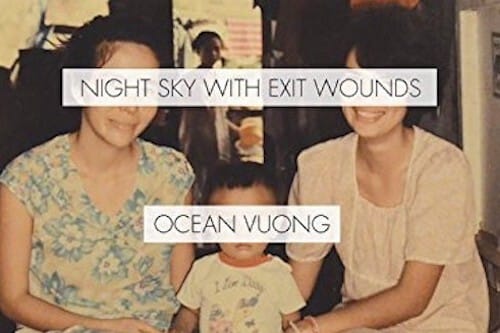Paisley Rekdal Responds to William Logan's Take on Ocean Vuong's Night Sky With Exit Wounds

At The Margins, Paisley Rekdal recalibrates William Logan's recent review of Ocean Vuong's Night Sky With Exit Wounds (Copper Canyon, 2016). Her anger over the review, Rekdal explains, is mostly over a few statements Logan makes about Confessional poetry. Also: "[W]e are to understand that apparently the only reason we are reading Vuong with enthusiasm at all is because of his racial and historical identity as a post-1975 Vietnamese refugee to the United States." To further excerpt:
My initial impulse was to defend Vuong’s poems against Logan’s review by re-examining the poems Logan criticizes because, though I had quibbles with Night Sky with Exit Wounds, clearly I enjoyed the collection in more ways than Logan. But as I did this, it became clear that Logan’s recitation of Vuong’s biography, Logan’s vision of Vuong himself, finally, overwhelmed his reading of Vuong’s poetry: in many ways, Logan’s fascination with Vuong’s “backstory” made Vuong’s poetry irrelevant. Logan instead created what might better be described as the specter of Vuong to raise larger questions about how we do, or should, read racial and historical identities in poems; what we imagine, or don’t know, about Vietnamese Americans; how we should write, or not write, about war; who should, or should not, write about war; and finally, how long we imagine wars to last in our cultural memories. The more I returned to Logan’s review, in fact, the more Logan’s review became obviously less about Night Sky at all than about reifying the misperceptions (perhaps both ill- and well-intended) that we have held about Asian American writers for the past several decades. In that sense, sadly, Vuong ceased to be Vuong in both Logan’s review and my response but, instead, is a stand-in for a myriad of other writers of Asian descent who are scrutinized by institutions that Logan’s review epitomizes. And in that sense, too, Logan ceased to exist and instead becomes emblematic of a larger critical architecture around race and writing that I have, over years, become depressingly familiar with. To respond to Logan’s essay truly on Logan’s terms requires not that I defend Vuong, nor even attack Logan. It requires that I engage with the ideas that Vuong represents to Logan, which have larger consequences for all writers of color, and implicates far more reviewers than Logan...
Read on at The Margins.


